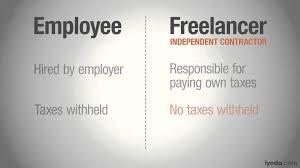The term freelancing or self-employing was originally developed by Sir Walter Scott (1771-1823) in Ivanhoe (1820) to express "medieval mercenary warrior" or free-lance, that is those who have nothing to do with the lord of their time. However, this word was changed into a verb by the authorities of Oxford University Press and afterwards to a noun, adjective, verb, adverb, and at last to the noun “freelancer".
European Commission does not invest legally on “freelancer” and defines it as the person “pursuing a gainful activity for their own account, under the conditions laid down by national law”. “Personal” and “independency” are the core elements of freelancing which collaborate the freelancers in doing their profession. “This definition comes from Directive (2010/41/EU) on the application of the principle of equal treatment between men and women engaged in an activity in a self-employed capacity.” The European Forum of Independent Professionals knows freelancers as: “a highly-skilled subset of self-employed workers, without employers nor employees, offering specialized services of an intellectual and knowledge-based nature”.
A freelancer or freelance worker does not denote a regular employee whose job is fixed and permanent, with a fixed salary who works fixed hours every days of the week. A freelancer is in fact a self-employed person who is employed by some companies, agencies, professional associations, or websites to do the temporary works of the clients. In other words, these companies and sites mediate between the clients and freelancers. This term is usually used for those who are involved in culture and creative industries like music, acting, writing, translating, illustrating, web design, computer programming (core points of cognitive-cultural economy). In the United States, the Freelancers Union reported that freelancers are around 42 million in 2013. However, in UK, they have not yet come up with an accurate estimation.
Around 1.7 million freelancers are claimed to be in UK. Upon Freelance Industry Report, women aged between 30 to 50 comprise the main portion of freelancing industry in 2012_ a portion contrary to the male-dominant world industries. Enhancing employment is the clear benefit of freelancing for the societies; however, for people this benefit may differ based on their gender, industry, and lifestyle. In 2012, Freelance Industry Report found out that females like the scheduling freedom and flexibility of freelancing and males like their enjoying from freelancing through valuing their personal interests. In general, allowing people to choose among the suggested works and the flexibility it has are enumerated as the benefits of such a work. Freelancing is a good choice for those who are not able to work permanently or are laid-off. In addition to the benefits of being a freelancer, there are some disadvantageous like lack of security, some unwise clients who do not pay on time, joblessness for a long time, no pension, sick leave, paid holidays, health insurance, receiving less money, dealing with low-cost suppliers. While freelancing has some advantages and disadvantages, it has been very valuable for those who need structure in their lives and are self-motivated to work independently.
 English
English Persian
Persian

